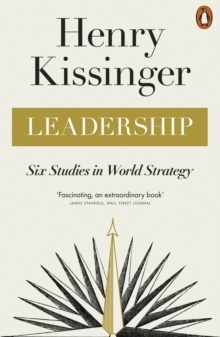Leadership
Six Studies in World Strategy

Editorial Penguin UK
Fecha de edición julio 2024 · Edición nº 1
Idioma inglés
EAN 9780141998688
528 páginas
Libro
encuadernado en tapa blanda
Dimensiones 129 mm x 198 mm
Resumen del libro
Henry Kissinger analyses how six extraordinary leaders he has known have shaped their countries and the world'Leaders,' writes Henry Kissinger in this compelling book, 'think and act at the intersection of two axes: the first, between the past and the future; the second between the abiding values and aspirations of those they lead. They must balance what they know, which is necessarily drawn from the past, with what they intuit about the future, which is inherently conjectural and uncertain. It is this intuitive grasp of direction that enables leaders to set objectives and lay down a strategy.'In Leadership, Kissinger analyses the lives of six extraordinary leaders through the distinctive strategies of statecraft which he believes they embodied.
After the Second World War, Konrad Adenauer brought defeated and morally bankrupt Germany back into the community of nations by what Kissinger calls 'the strategy of humility'. Charles de Gaulle set France beside the victorious Allies and renewed its historic grandeur by 'the strategy of will'. During the Cold War, Richard Nixon gave geostrategic advantage to the United States by 'the strategy of equilibrium'.
After twenty-five years of conflict, Anwar Sadat brought a vision of peace to the Middle East by a 'strategy of transcendence'. Against the odds, Lee Kwan Yew created a powerhouse city-state, Singapore, by 'the strategy of excellence'. Although when she came to power Britain was known as 'the sick man of Europe', Margaret Thatcher renewed her country's morale and international position by 'the strategy of conviction'.
To each of these studies, Kissinger brings historical perception, public experience and - because he knew each of their subjects, and participated in many of the events he describes - personal knowledge. The book is enriched by insights and judgements such as only he could make, and concludes with his reflections on world order and the indispensability of leadership today.
Biografía del autor
Nacido en una familia judía alemana que huyó a Estados Unidos en 1938. Profesor en Harvard desarrolló un seminario sobre relaciones internacionales de 1951 a 1960, desarrollando una teoría pragmática de las relaciones diplomáticas, contraria a basarla en planteamientos ideológicos y dispuesta a legitimar el uso de lo fuerza cuando estuvieran en juego los "intereses nacionales" estadounidenses. Aunque no rechazaba la guerra como medio de acción internacional, era partidario de evitar una generalización de los conflictos mediante los contactos diplomáticos con los adversarios ("política de pequeños pasos"), que permitieran disipar las desconfianzas mutuas.<br><br>El presidente Nixon le incorporó a su administración en 1969 con el cargo de secretario ejecutivo del Consejo de Seguridad Nacional. Desde ese puesto dirigió de hecho la política exterior de Washington, antes de que fuera nombrado Secretario de Estado en 1973.<br><br>Preocupado ante todo por las relaciones con la URSS, fomentó también el acercamiento a China con su visita en 1971, previa a la de Nixon el año siguiente. Veía esta distensión con Pekín como un medio indirecto que podría hacer mejorar las relaciones con Moscú.<br><br>Partidario de la desvinculación norteamericana en el conflicto de Vietnam, dirigió las negociaciones que llevaron al acuerdo de alto el fuego de París en enero de 1973. Esto le valió, junto al representante norvietnamita Led Duc Tho, el Premio Nobel de la Paz.<br><br>Sus dotes diplomáticas permitieron reforzar, tras la guerra del Yom Kippur en 1973, la influencia norteamericana en Oriente Medio.<br><br>Siguió como Secretario de Estado con Gerald Ford (1974-1976) y mantuvo un cierto grado de influencia en la administración especialmente durante la presidencia de Ronald Reagan (1980-1988).








